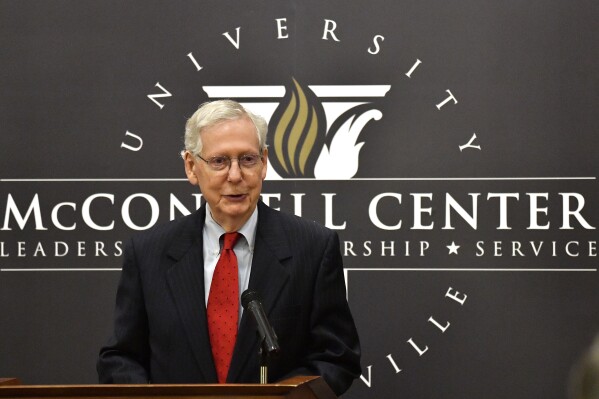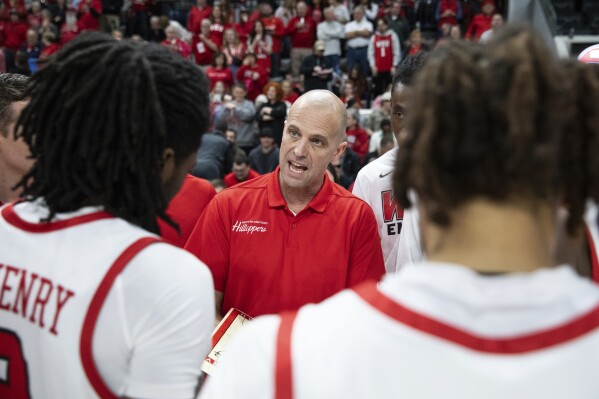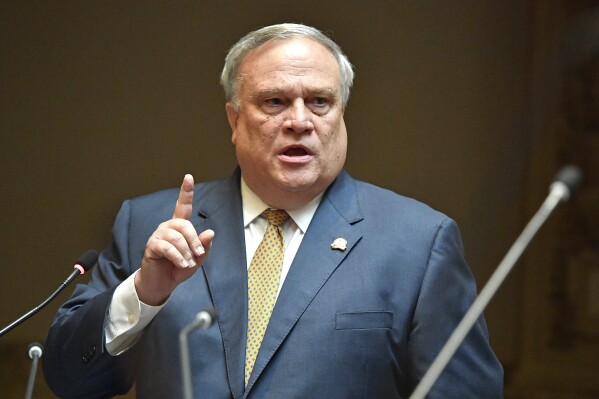Governor says budgetary cap would limit his immediate response to natural disasters in Kentucky
FRANKFORT, Ky. (AP) — Democratic Gov. Andy Beshear was at a podium Wednesday for a familiar scene: to discuss damage from the latest round of storms that battered Kentucky. But this time he contended that a new Republican-backed policy threatens to tie his hands in responding to any future disasters.
A day after storms spawned multiple tornadoes that caused widespread damage in several counties, the governor criticized a provision in the budget bill passed by lawmakers that he said would limit how much his administration could spend to respond immediately to such emergencies.
Once reaching that cap, he’d have to ask lawmakers for more immediate funding, which would require a special session if they’re not meeting at the time, Beshear said.
Beshear signaled that he would line-item veto the provision in the two-year budget measure, which he said sets the limit at $25 million per fiscal year. The legislature’s Republican supermajorities could override the veto when lawmakers reconvene in mid-April for the final two days of this year’s session.
Mindful of that, the governor appeared willing to compromise.



“If they don’t want to remove the limitation entirely, at least make it bigger,” Beshear said.
However, state Senate President Robert Stivers, a Republican, disputed Beshear’s assertion that his hands would be tied, saying the governor would have “ready access” to considerably more emergency funding.
Another budget bill provision would make up to $50 million available each year in the event of a presidential disaster declaration, to be used to match federal aid.
If an emergency is so significant that it requires spending more than that, the governor “has a responsibility” to call lawmakers into special session, Stivers said.
“Otherwise he suggests we forgo our constitutional duties as the branch responsible for the purse of the Commonwealth of Kentucky,” Stivers said in a statement.
The governor’s office responded that freeing up that additional money would take time, meaning it wouldn’t be available in the aftermath but could take weeks or months following a natural disaster.
Beshear has expressed alarm about the issue since January. On Wednesday he said if the cap had been in place in the current fiscal year, it would have been exceeded even before severe storms hit portions of northern Kentucky last month.
Emergency funds can be used to provide shelter and food for people displaced by storms, as well as costs associated with activating the National Guard to assist after natural disasters.
During his tenure, Beshear has spent considerable time leading the state’s response to massive storms. In late 2021, tornadoes killed scores of people in western Kentucky, and in 2022, floodwaters in Appalachia left dozens more dead. Each time, the governor won high marks for his response, which contributed to his reelection victory last year in a state that otherwise has shifted toward the GOP.
Beshear said Wednesday that his criticism of the spending cap is a matter of policy, not politics.
“We know that there are going to be people out there that need help in the future,” he said. “All I’m asking for is the ability to help them in the short term. And I hope that we can get that fixed so that we always have the resources to help our neighbors when they’ve been knocked down.”
If that immediate funding runs out when the next massive storm hits, the need to reconvene might mean that lawmakers could be at risk as they make their way to the statehouse amid an ongoing disaster, the governor said. Meanwhile, the immediate needs of people who lost their homes and possessions have to be met, he said.
Stivers said the cost of reconvening lawmakers in special session would amount to “pennies on the tens of millions of dollars we’d allocate” while ensuring the governor’s collaboration with the legislature.
After last month’s storms in northern Kentucky, the state offered lodging at a state park for displaced people, Beshear said. The state did the same thing after tornadoes in the west and flooding in the east.
Beshear said he didn’t know how his administration would deal with the limitations, using last month’s storm as an example.
“Could we have opened General Butler (state resort park) and run their credit card, saying, ‘We hope the General Assembly’s going to come through and we’re going to have more funding, but otherwise we’re going to send you a bill?’” the governor said. “To do that to people after they’ve lost their home or have just gone through a tornado … is pretty wrong.”
___
Associated Press writer Rebecca Reynolds contributed to this report.
Disclaimer: The copyright of this article belongs to the original author. Reposting this article is solely for the purpose of information dissemination and does not constitute any investment advice. If there is any infringement, please contact us immediately. We will make corrections or deletions as necessary. Thank you.





